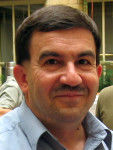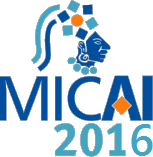|
|
Announcements
| May 24 | Check your paper in the preliminary table of contents for the LNAI proceedings. | |||
| Oct 23 | Pre-print version of each paper can be accessed. The password has been sent to all authors. | |||
15th
Mexican International Conference on Artificial Intelligence
October 23–29 • Cancún, Mexico
Springer LNAI;
CPS
(anticipated); journals;
special issues of journals.
Keynote speakers:
Efstathios
Stamatatos,
Imre J. Rudas,
Vladik Kreinovich,
G. Vargas Solar;
special talk:
Ángel Kuri.
Tours to unique attractions:
Chichen Itza (one of
New Seven Wonders of the World);
Coba archeological site (tentative).
Acceptance rate (oral session, LNAI volume) target around 25% -
See information about student grants
Collocated: Workshops / Call for Workshops,
Tutorials /
Call for Tutorials,
Call for Doctoral Consortium
 |
|
 |
 |
 |
||||
|
Efstathios
Stamatatos, U. of the Aegean, Greece |
Imre J. Rudas, Óbuda U., Hungary |
Vladik Kreinovich, U. Texas El Paso, USA |
G. Vargas Solar, CNRS, France |
Ángel Kuri, ITAM, Mexico |
Please distribute the CFP: long or short version - poster: DOC, PDF
MICAI was
characterized by Springer as premier conference in Artificial
Intelligence. It is a
high-level peer-reviewed international conference covering all areas of
Artificial
Intelligence, traditionally held in
All previous editions of MICAI were published in Springer LNAI, and the Special Sessions of most of the past MICAI events have been published by the CPS; At past MICAI events, extended versions of a considerable number of the LNAI papers were invited to special issues of journals, including ISI JCR-indexed journals; see for example a special issue on MICAI of Expert Systems with Applications. Recent MICAI events received over 300–400 submissions from over 40 countries each, with acceptance rate around 25% for the main session.
MICAI 2016 will be organized by the Mexican Society of Artificial Intelligence (SMIA) in collaboration with the Instituto Tecnológico de Cancún.
Publication: Papers accepted for long oral presentation will be published by Springer in a volume of the series Lecture Notes in Artificial Intelligence (LNAI). Special Session papers (or main session papers of which the authors choose this) will be published post-conference by CPS and a number of prestigious journals. Best papers awards will be granted to the 1st, 2nd and 3rd places. Special issues of journals are anticipated for best papers. Extended versions of selected papers are expected to be invited to special issues of journals, including ISI JCR-indexed journals. Traditionally at MICAI, the results of the SMIA Best Thesis in Artificial Intelligence Contest are announced.
| June 28 |
Expression of interest: registration of draft abstracts -- just a general idea of what your paper will be about (why not submitting it now and change it later if needed?) |
|
| July 7 |
Uploading of full text of registered papers for blind review. Contact us for late submissions. |
|
| August 15 |
|
Notification. By now, all acceptance notifications have been sent. |
| September 15 |
|
Camera-ready and payment deadlines for LNAI papers only |
| October 1 |
Camera-ready deadline for poster papers |
|
| October 23 |
Pre-conference events (registration, meetings) |
|
| October 24–25 |
Pre-conference events (workshops, tutorials) |
|
| October 26–28 |
Main conference (keynote and regular talks, cultural program) |
|
| October 29 |
Post-conference events (meetings, cultural program) |
|
Tours to unique attractions:
|
 |
Efstathios
Stamatatos,
U. of the Aegean,
Greece Title: Towards the Use of Authorship Attribution as Forensic Evidence Abstract: Authorship attribution is the attempt to reveal the authors behind texts based on the assumption that the personal style of authors can be quantified and represented within a computational model. This line of research has a long history and it used to be mainly associated with analysis of literary texts of disputed authorship. Given the vast amount of texts in electronic form in countless media, authorship analysis can now play a crucial role in the framework of forensic applications as well as in social media analytics. Despite the fact that significant progress is reported in relevant literature, it is still questionable whether this technology is reliable enough to be used as evidence in court. This talk will focus on the main factors that are associated with using authorship attribution as forensic evidence. Moreover it will present recent advances in this field that aim at this direction. |
|
|
|
Imre J. Rudas,
Head of University and Research Center,
Óbuda U.,
Hungary Title: Cloud Robotics Abstract: Cloud Robotics is an emerging field within robotics, currently covering various application domains and robot network paradigms. Cloud Robotics was born from the merger of cloud technologies and robotics. Cloud technology-based computing—or simply Cloud Computing—is one of the most dynamically growing areas of Info-Communication Technologies (ICT). The presentation summarizes the basics of cloud computing, namely the main idea, the definition, the cloud model composed of essential characteristics, service models and deployment models. The next part provides a structured, systematic overview of the numerous definitions, concepts and technologies linked to Cloud Robotics and cloud technologies in a broader sense. It also presents a roadmap for the near future, describing development trends and emerging application areas. Cloud Robotics may have a significant role in the future as an explicitly human-centered technology, capable of addressing the dire needs of our society. Finally some cloud robotics projects are discussed. The last part of the presentation summarizes the results and ideas of a new generation internet and Cloud Technology based Virtual Collaboration Arena (VirCA) developed in Hungary and some of its application possibilities in Cloud Robotics. VirCA provides a platform where users can build, share and manipulate 3D content, and collaboratively interact with real-time processes in a 3D context, while the participating hardware and software devices can be spatially and/or logically distributed and connected together via IP network. The 3D content and processes in VirCA can be synchronized with the real world, which allows the combination of reality and virtual world in the collaboration arena. |
|
 |
Vladik Kreinovich,
U. Texas El Paso,
USA Title: Decision Making under Interval (and More General) Uncertainty: Monetary vs. Utility Approaches Abstract: How to make a decision under interval uncertainty? In many situations, e.g., in financial and economic decision making, the decision results either in a money gain (or loss) and/or in the gain of goods that can be exchanged for money or for other goods. In such situations, interval uncertainty means that we do not know the exact amount of money that we will get for each possible decision, we only know lower and upper bounds on this amount. In this case, a natural idea is to assign a fair price to different alternatives, and then to use these fair prices to select the best alternative. In the talk, we show how to assign a fair price under interval uncertainty. We also explain how to assign a fair price in the case of more general types of uncertainty such as p-boxes (bounds on cumulative distribution function), twin intervals (when we only know approximate bounds), fuzzy values (when we have imprecise expert estimates of the gains), etc. In other situations, e.g., when buying a house to live in or selecting a movie to watch, the result of the decision is the decision maker's own satisfaction. In such situations, a more adequate approach is to use utilities - a quantitative way of describing user's preferences. In this talk, after a brief introduction describing what are utilities, how to evaluate them, and how to make decisions based on utilities, we explain how to make decisions in situations with user uncertainty - a realistic situation when a decision maker cannot always decide which alternative is better for him or her. |
|
 |
G. Vargas Solar,
CNRS,
France Title: Artificial Intelligence and Big Data management: the dynamic duo for moving forward data centric sciences Abstract: After vivid discussions led by the emergence of the buzzword “Big Data”, it seems that industry and academia have reached an objective understanding about data properties (volume, velocity, variety, veracity and value), the resources and “know how” it requires, and the opportunities it opens. Indeed, new applications promising fundamental changes in society, industry and science, include face recognition, machine translation, digital assistants, self-driving cars, ad-serving, chat-bots, personalized healthcare, smart industry and more. The first lesson of the era of “Big Data” is that it is possible to access and exploit representative “samples” of available data collections thanks to the availability of the necessary resources for storing it and running greedy processing tasks on it. The second lesson is that computer science and mathematics disciplines must generate synergy with other sciences in order to exploit these new available “value”. The consequence is the emergence of “new” data centric sciences: data science, digital humanities, social data science, network science, computational science. These sciences with their new requirements and challenges call for a need to revisit the fundaments of databases, artificial intelligence and other disciplines used for addressing them with new perspectives. This novel and multidisciplinary data centric and scientific movement, promises new and not yet imagined applications that rely on massive amounts of evolving data that need to be cleaned, integrated and analysed for modelling purposes. Yet, data management issues are not usually perceived as central. In this keynote I will explore the key challenges and opportunities for data management in this new scientific world, and discuss how a possible data centric artificial intelligence community can best contribute to these exciting domains. If the moto is not academic, huge numbers of dollars being devoted to related applications are moving industry and academia to analyse these directions. |
|
 |
Special talk: Ángel Fernando Kuri Morales, ITAM, Mexico. Title: Mining Text: A computational Intelligence Approach |
Topics of interest are all areas of Artificial Intelligence, including but not limited to:
|
|
The registration fee amount for authors is USD 590 (the same as in all previous years) or MXN 11,000. This includes one paper only. If one author has more than one accepted paper, in order for the papers to be published the fee is to be paid for each of them independently, with a discount of USD 100 or MXN 1500, i.e., for the second etc. paper presented by the same author, an additional fee of USD 490 or MXN 9,500 is to be paid. If you pay via bank transfer or PayPal, you should add the bank fees, so the amount that you will pay will be higher. In summary:
|
|
Bank from Mexico | Bank from abroad | PayPal |
| First paper | USD 590 = MXN 11,000 | USD 590 plus bank fees | USD 620 |
| Second etc. paper presented by the same author | USD 490 = MXN 9,500 | USD 490 plus bank fees | USD 520 |
This fee includes publication of one paper (up to the page limit) in any of the proceedings volumes or journal issues derived from the conference, one hard copy of a proceedings volume (where the corresponding paper was published; other volumes are not included), access to a digital copy of the pre-print versions of all accepted papers (unless copyright holders prevent us from distributing such copies), conference material, and attending the keynote lectures, regular technical presentations, and the poster session.
Additional fee applies for papers that exceed the page limit (USD 10 per additional page, in either review or camera-ready version, whichever is greater), for purchasing a hard copy of the proceedings (USD 75), for participating in some of the cultural activities, and for accompanying persons to participate in some of the cultural activities.
Registration fee for non-author attendees (main conference, tutorials, and workshops) and workshop authors will be lower. It will be announced later.
|
A very limited number of student grants for full-time students from developing countries (Mexico included) will be given to applicants in thoroughly justified cases and only to the applicants that will attend the conference in person. Strong preference will be given to the authors of the papers that received excellent evaluation scores and of which the applicant is the main author.
We solicit original research papers written in English. The submissions must not have been previously published or be under review for another conference or journal. Only complete and finished papers will be reviewed, not abstracts. After your paper is accepted you will have a chance to improve it according the comments of the reviewers, but the reviewers will assume that the text that they are reading is the text that is to be published, with the only changes they explicitly request (as opposed to reviewing a draft or abstract). In particular, the papers must be submitted in the required format. We reserve the right to reject without review the submissions that do not follow the format guidelines.
Submission procedure. Submissions are received electronically. The submission and reviewing procedure is handled the the EasyChair system. To submit a paper:
If you have not a user of the EasyChair system, you will need to register using the "I have no EasyChair account" button. Please do not send us your submissions by email. Please contact us in case of problems.
Submission is done in two phases. First, by the expression of interest deadline, we only need the tentative title and a draft abstract of your paper (you can change this later); they will be used only to reserve the appropriate reviewers for your paper - why not doing it right now? Later, by the full paper submission deadline, we will need the full text of your paper, as a PDF file. Both the draft abstract and full paper are uploaded via the EasyChair system. If you read this late, or need more time, you can upload your paper while the system is open, or contact us for late submissions.
Submission of the paper assumes that at least one author will register at the conference and present an accepted paper or poster. Full registration fee should be paid for each accepted paper.
Size. Registration fee for authors includes publication of a paper of up to 12 pages, though more pages can be used for a small additional fee. We strongly encourage authors to use as many pages as really necessary for an excellent paper: longer papers have better impact and receive more citations. Do not sacrifice the quality of your paper to squeeze it into the page limit.
For each page that exceeds this limit small extra fee of USD 10 will be charged. If your page exceeds 20 pages, please contact the organizers first. The additional fee is charged for the pages exceeding the page limit in either the version submitted for review or in the camera-ready version, whichever is greater. In particular, you must not shorten the camera-ready version in comparison with the version submitted for review unless the reviewers required this (contact us if you feel you should do shorten it; in any case this would not reduce the fee). However, we encourage you to use as many pages as you really need for an excellent paper, even if you will pay a very small fee for it -- that it, we recommend you not to sacrifice clarity and completeness of your paper for the page limit.
Double blind review policy: the review procedure is double blind. Thus the papers submitted for review must not contain the authors' names, affiliations, or any information that may disclose the authors' identity (this information is to be restored in the camera-ready version upon acceptance). In particular, in the version submitted for review please avoid explicit auto-references, such as "in [1] we show" -- consider "in [1] it is shown". I.e., you may cite your own previous works provided that it is not deducible from the text that the cited work belongs to the authors. When citing your previous work, please keep the names:
Incorrect: In [1] we have shown ...
1. <Hidden for review>, Syntactic Structures, The Hague, Mouton, 1957.Correct:
In [1] it was shown ...
1. Chomsky, N., Syntactic Structures, The Hague, Mouton, 1957.
Format. The submissions are to be formatted in strict accordance with the Springer LNCS format guidelines. You can find here some useful advice on formatting.
Workshops, Tutorials, Doctoral Consortium
Workshops and tutorials will be organized in conjunction with MICAI 2016; see Workshops / Call for Workshops, Tutorials / Call for Tutorials, Call for Doctoral Consortium.
|
Workshops:
Tutorials:
|
MICAI 2016 will be held in Cancún, Mexico, at Iberostar Cancún (don't yet book, see below), located at Boulevard Kukulcan km. 17, some talks being presented at Instituto Tecnológico de Cancún, Av. Kabah, Km. 3 Cancún Quintana Roo México C.P. 77515, Col. Centro. All local transportation, such as tour buses, will be organized to/from the Iberostar Cancún hotel.
Please do not book a room separately; we have sent to all authors a link for discounted price (if you have not received it, contact us).
The official hotel, all-inclusive, is rather expensive. Sharing the room would result in saving of USD ~50 per person per night. If you want to share a room with another participant, please contact us (indicating dates of stay, gender, smoking or not); we will try to match your request with another similar request (no guarantee).
Also there are much cheaper hotels in the downtown Cancun (city center), outside the tourist zone. The downtown is in 20-25 min (20 km) drive by bus or taxi. One-way bus trip costs USD 1-2, taxi USD 10-20 or so. We cannot recommend any specific hotel in the downtown. We can also try to match room sharing requests for downtown hotels.
|
See program overview and detailed program. NEW Pre-print version of each paper can be accessed. The password has been sent to all authors. The general schedule of the conference will be as follows:
|
Conference chair: Grigori Sidorov
Program chairs:
Grigori Sidorov, Oscar Herrera Alcántara, Sabino Miranda
Jiménez, Obdulia Pichardo Lagunas.
Program Committee
| Abraham Sanchez Lopez Adel Alimi Albert Bifet Alberto Reyes Alberto Reyes Ballesteros Alejandro Rosales Alessandro Ricci Alexander Gelbukh Alexander Tulupyev Alexandra Balahur Alfredo Arias-Montaño Alfredo Gabaldon Aline Villavicencio Alisa Zhila Ana Gabriela Gallardo-Hernández Anastasios Bezerianos Anastasios Tefas Andrea Formisano Angel Kuri-Morales Anilu Franco-Arcega Antonio Hernandez Antonio-José Sánchez-Salmerón Aristidis Likas Arles Rodriguez Arturo Garcia-Perez Arturo Gonzalez Asif Ekbal Aurelio Lopez Bernadette Sharp Bernardete Ribeiro Bogdan Smolka Bruno Lara C. Alberto Ochoa-Zezatti Carlos Arturo Gracios-Marin Carlos Garcia-Capulin Carlos Mario Zapata Jaramillo Carlos Montoro Chaman Sabharwal Claude Frasson Claudia Zepeda Cortes Dario Landa-Silva David Claudio Gonzalez David Pinto Denis Filatov Diana Inkpen Dieter Hutter Dieter Mitsche Dunja Mladenic Eber Enrique Orozco Guillén Edgar Vallejo Eduardo Cabal-Yepez Eduardo Gomez-Ramirez Eduardo Rodriguez-Tello |
Efrén Mezura-Montes Efren Gorrostieta Efstathios Stamatatos Ekaterina Ovchinnikova Erik Cambria Erik Cuevas Erik Rodner Eugene Levner Fanhai Yang Felipe Orihuela-Espina Felix Calderon Felix Castro Espinoza Felix F. Gonzalez-Navarro Fernando Aldana Fevrier Valdez Francisco Martínez-Álvarez Francisco Viveros Jiménez Friedhelm Schwenker Gibran Etcheverry Gregorio Toscano Pulido Grigori Sidorov Guillem Alenya Guillermo De Ita Guillermo Morales-Luna Guillermo Sanchez-Diaz Gustavo Arroyo Gustavo Cerda-Villafana Héctor Jiménez Salazar Héctor Pérez-Urbina Heriberto Cuayahuitl Heydy Castillejos Hiram Calvo Horacio Rostro Gonzalez Hugo Jair Escalante Humberto Sossa Ildar Batyrshin Iria Da Cunha Ivan Mesa Ivan Olmos Ivan Razo Ivan Vladimir Meza Ruiz Ivandre Paraboni J. Raymundo Marcial-Romero Jaime Mora-Vargas Jesús Emeterio Navarro-Barrientos Jesus Angulo Joaquin Gutierrez Johan Suykens Jorge Solis José Alberto Hernández Aguilar Jose Arrazola Jose Luis Carballido Jose Ruiz-Pinales |
Jose Santos Josef Steinberger Juan Arturo Nolazco Flores Juan C. Acosta-Guadarrama Juan Carlos Nieves Juan Humberto Sossa Azuela Juan J. Flores Klempous Ryszard Konstantinos Koutroumbas Kostas Triantafyllopoulos Laetitia Jourdan Leonardo Trujillo Leszek Nowak Lourdes Martínez Luciano Sanchez Luis Enrique Sucar Luis Martí Ma. de Guadalupe Garcia-Hernandez Magdalena Ortiz Manuel Montes-Y-Gómez Manuel Vilares Ferro María Auxilio Medina Nieto Maria De Marsico Maria Lucia Barrón-Estrada Marianna Apidianaki Marino Sánchez Parra Mario Pavone Mark Hasegawa-Johnson Marta R. Costa-Jussà Masaki Murata Mathieu Lafourcade Mauricio Osorio Michael Carl Michael T.M. Emmerich Michele Nappi Miguel Gonzalez-Mendoza Miguel Félix Mata Rivera Mikhail Mikhailov Nicolas Younan Nicoletta Calzolari Niladri Chatterjee Noé Alejandro Castro-Sánchez Obdulia Pichardo Oleksiy Shulika Olga Kolesnikova Oliver Schuetze Omar López-Ortega Onofrio Gigliotta Orion Reyes Oscar Castillo Oscar Dalmau Oscar G. Ibarra-Manzano Oscar Herrera |
Pablo H. Ibarguengoytia Pablo Ibarguengoytia González Panagiotis Vlamos Paolo Rosso Partha Pakray Patricia Melin Patrick Siarry Pedro Flores Pinar Karagoz Piotr W. Fuglewicz Ponciano Jorge Escamilla-Ambrosio R. Carolina Medina-Ramirez Rafael Batres Ramon Zatarain Raul Monroy Raúl Garduño Ramírez Reyer Zwiggelaar Ricardo Landa Ricardo Martinez Risto Fermin Rangel Kuoppa Rocio Lizarraga-Morales Rodolfo Ibarra Rogelio Hasimoto Roger Nkambou Roxana Girju Sánchez López Abraham Sabino Miranda Salvador Ruiz Correa Sergio Ledesma Shahnaz Shahbazova Shiliang Sun Sivaji Bandyopadhyay Sofia N. Galicia-Haro Sonia Ordoñez Stefania Costantini Stefano A. Cerri Stephane Marchand-Maillet Tanja Magoc Ted Pedersen Teresa Alarcón Thamar Solorio Valia Kordoni Vania Dimitrova Vera Lúcia Strube De Lima Victor Ayala-Ramirez Victor Muñiz Virgilio Lopez-Morales Vlad Estivill-Castro Vladik Kreinovich Volodymyr Ponomaryov Yasmín Hernández Pérez Yasunari Harada Yoel Ledo Mezquita Yulia Ledeneva |
|
|
Download the famous |







